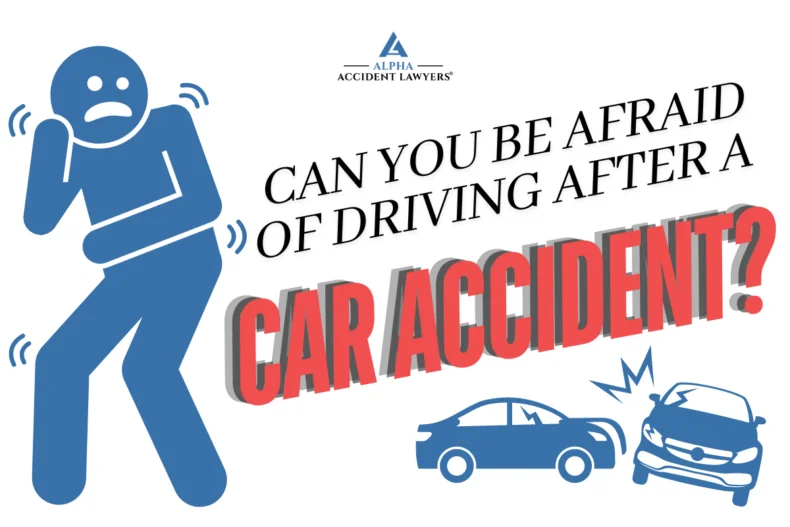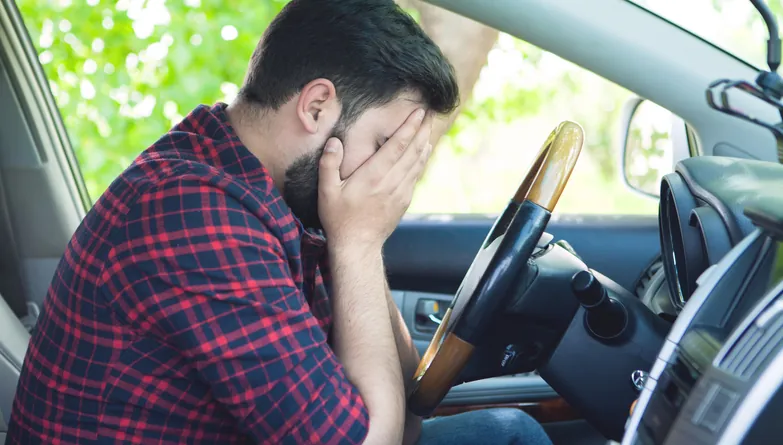What Is Vehophobia?
If you feel anxious or scared of driving after a car accident, you are not alone. The intense fear of driving, also known as vehophobia, is common for many individuals who have been involved in a traumatic accident or witnessed a car crash. This specific phobia can stem from the memory of the car accident, the perceived danger of being on the road, or the fear of losing control behind the wheel.
If you were involved in a car accident caused by someone else’s negligence, it’s essential to consult with an experienced car accident lawyer. For years, Alpha Accident Lawyers has helped auto accident victims recover fair compensation for their physical, emotional, and financial damages. We’re here to help you obtain justice and hold the responsible party accountable. Call us at (800) 544-8000 to schedule a free consultation.
What Causes Vehophobia?
There are over 6 million traffic accidents in the US each year. The trauma from car accidents can leave lasting psychological scars, leading to an overwhelming fear of driving.
Vehophobia is often considered a form of post-traumatic stress disorder (PTSD) because it involves similar psychological responses to trauma. Fearful drivers may experience flashbacks, nightmares, and severe anxiety related to the traumatic event of a car accident. People with an intense fear of driving may experience significant distress and anxiety at the thought of driving or being a passenger in a vehicle. This fear can be so debilitating that it interferes with their daily activities, such as commuting to work, running errands, going to social events, or visiting friends or family.
Causes of vehophobia can include:
- Being involved in an auto accident
- Being scared of driving after witnessing an auto accident
- Driving in dangerous weather conditions involving heavy rain, snow, or ice
- Being a passenger in a vehicle with a reckless driver or road rager
- Hearing about tragic road incidents
- Seeing a loved one injured or killed in a car crash
- Other anxiety disorders, such as agoraphobia or claustrophobia, can exacerbate one’s fear of driving or being in a vehicle
Witnessing a serious car accident can be just as traumatic as being involved in one. The specific phobia of riding in any vehicle is known as amaxophobia. This fear can stem from the shock and horror of seeing the accident and its aftermath. The fear may be accompanied by feelings of helplessness or survivor’s guilt.
Common Symptoms of Driving Phobia
Driving phobia has symptoms similar to other other anxiety disorders, which can be both psychological and physical. Some common symptoms include:
- Intense anxiety: Feeling an overwhelming sense of dread or panic at the thought of driving or being in a car. Lack of trust in one’s driving skills can also cause someone to have anxiety behind the wheel.
- Avoidance behavior: Going out of one’s way to avoid driving, such as taking public transportation or relying on others for rides.
- Flashbacks: Reliving the traumatic car accident through vivid memories or nightmares.
- Hypervigilance: Being excessively aware of potential dangers while on the road, even in safe driving conditions.
- Panic attacks: Panic attacks while driving are a common occurrence for individuals with driving phobia. These attacks can be sudden and debilitating and often include symptoms such as shortness of breath, chest pain, dizziness, and a sense of losing control.
Physical Symptoms
- Sweating: Excessive perspiration, especially on the palms, which can make holding the steering wheel difficult.
- Shaking or trembling: Uncontrollable shaking or trembling, particularly in the hands and legs.
- Rapid heartbeat: When a person goes in shock, the decreased flow of oxygen-rich blood can cause the heart rate to increase, resulting in faster, shallower breathing.
- Shortness of breath: Difficulty breathing or a feeling of being unable to catch one’s breath.
- Dizziness: This can include feeling lightheaded or faint.
- Nausea: A sensation of sickness or stomach upset, which can be exacerbated by anxiety.
How to Overcome the Fear of Driving
The fear of driving can affect one’s mental and physical health, relationships, and daily life. While there is no “one size fits all” treatment, individuals suffering from the fear of driving may require different treatment options to address their specific phobias and needs.
Cognitive Behavioral Therapy (CBT)
Cognitive Behavioral Therapy (CBT) focuses on identifying and challenging negative thought patterns that contribute to the fear of driving. By replacing these thoughts with more realistic and positive ones, individuals may reduce their anxiety and improve their confidence behind the wheel.
CBT also utilizes relaxation techniques such as deep breathing, progressive muscle relaxation, and mindfulness to help manage severe driving anxiety. Breathing exercises may involve taking a few deep breaths while listening to soothing music.
Prolonged Exposure Therapy (PE)
Prolonged Exposure Therapy (PE) is a form of cognitive-behavioral therapy specifically designed to help individuals confront and process traumatic memories. PE involves repeated, gradual exposure to driving-related stimuli in a controlled and safe environment.
The goal is to reduce the fear response by allowing the individual to re-experience the trauma without the actual danger, thereby desensitizing them to the anxiety triggers. PE may be effective in treating driving phobia, especially when combined with other therapeutic techniques.
Virtual Reality Exposure Therapy
Virtual Reality Exposure Therapy (VRET) is an innovative approach that uses virtual reality technology to simulate driving experiences in a controlled setting. This allows individuals to face their fear of driving without being on the actual road.
VRET provides a safe and immersive environment where individuals can gradually expose themselves to various driving scenarios, from driving in the city to more complex situations like highway merging or adverse weather conditions. The realistic aspect of virtual reality can help drivers reduce anxiety and build confidence behind the wheel. The therapist can control the scenarios and tailor the exposure to the individual’s specific fears and progress.
Medication
Medication may be helpful for individuals struggling with severe anxiety or panic attacks related to driving. Common medications prescribed for driving phobia include antidepressants such as beta-blockers, selective serotonin reuptake inhibitors (SSRIs), and anti-anxiety medications like benzodiazepines.
It’s important to consult with a healthcare professional to determine the most appropriate medication and dosage and to monitor for any side effects.
Defensive Driving Courses
Defensive driving courses teach advanced driving techniques that emphasize safety, awareness, and accident prevention. Participants can learn how to handle unexpected situations, such as sudden stops, adverse weather conditions, and aggressive drivers. By better understanding how to navigate road challenges, individuals can reduce their anxiety behind the wheel and feel more in control while driving.
Support Groups
Being part of a support group provides a valuable resource for individuals coping with driving phobias. These groups offer a safe and supportive environment where people can share their experiences, challenges, and successes with others who understand what they are going through.
Hearing from others who have successfully overcome their driving fear can be incredibly encouraging and motivating. Whether in-person or online, support groups can play a key role in helping fearful drivers feel less isolated and more empowered to tackle their fear of driving.
What Compensation Can I Pursue in a Car Accident Claim?
If you sustained injuries in a car accident, you may be able to pursue compensation for the following damages in a personal injury claim:
- Medical expenses: Coverage for all medical costs related to the accident, including emergency care, hospital visits, surgeries, medications, and ongoing therapy.
- Lost wages: Compensation for any lost income due to the inability to work, including future earning potential if the injuries result in long-term disability.
- Pain and suffering: Monetary compensation for physical pain and emotional distress caused by the accident and its aftermath. This can include damages for driving-related fear (DRF) or driving phobias.
- Property damage: Reimbursement for repairs or replacement of your vehicle and any other property damaged in the accident.
- Rehabilitation costs: Coverage for physical therapy, medical treatments, long-term personal care, and other rehabilitation services needed for recovery.
Speak to a Compassionate Car Accident Lawyer
If you have suffered a car accident injury, you should seek medical attention and speak with a medical professional promptly. Follow your prescribed treatment plan, and ensure you document your injuries. Then, consider consulting with a skilled car accident lawyer who can help you pursue compensation for your damages.
At Alpha Accident Lawyers, we are committed to helping injured victims recover the maximum compensation for their injuries and losses. We offer a free initial consultation to learn more about your case and inform you of your legal options. Call today for a no-obligation, free case evaluation.
Call for Your Free Consultation




![Renee Gonzalez Killed in Pedestrian Accident on Highway 199 [Springtown, TX]](https://alphaaccidentlawyers.com/wp-content/uploads/2023/11/iStock-1472245535-1-720x480.jpg.webp)

